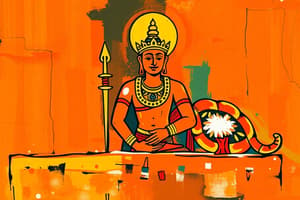Podcast
Questions and Answers
What is the term used in Theravada Buddhism to describe suffering?
What is the term used in Theravada Buddhism to describe suffering?
- Tanha
- Dukkha (correct)
- Nirodha
- Samudaya
What does the term 'samudaya' refer to in the context of the Second Noble Truth?
What does the term 'samudaya' refer to in the context of the Second Noble Truth?
- Desire for sensual pleasure
- Cessation of suffering
- The cycle of rebirth
- Roots of suffering (correct)
According to Buddhism, what does the practice of stopping all craving achieve?
According to Buddhism, what does the practice of stopping all craving achieve?
- Cessation of suffering (correct)
- Perpetuation of dukkha
- Increased desire for life
- Rebirth into another life of joy
What aspect of human relationships is highlighted in the context of suffering in Buddhism?
What aspect of human relationships is highlighted in the context of suffering in Buddhism?
Which desire is identified as a source of suffering in Buddhism?
Which desire is identified as a source of suffering in Buddhism?
Flashcards are hidden until you start studying
Study Notes
King Ashoka
- Ruled northern India for 35 years, significantly influencing Buddhist history.
- Used his authority to promote the teachings of Buddha, transforming religious practices.
Expansion of Buddhism
- First country to embrace Buddhism was Sri Lanka, aided by Ashoka’s ambassadors.
- Growth continued to Myanmar, Thailand, Cambodia, Laos, Malaysia, and Vietnam.
- Sri Lanka serves as a crucial center for preserving Buddhist history.
Theravada Buddhism
- Translates to "the way of the elders," recognized as the purest form of Buddhism.
- Widely spread across Southeast Asian countries, maintaining traditional practices.
- New movements emerged following King Ashoka’s period.
Mahayana Buddhism
- Known as "a large vehicle," it offers an expansive interpretation of Buddhist teachings.
- Utilizes the metaphor of a river for rebirth and spiritual liberation.
- Functions like a vessel leading individuals towards enlightenment.
Tibetan Buddhism
- Also referred to as “thunderbolt” or “diamond vehicle,” it is a sub-branch of Mahayana Buddhism.
- Recognized as an esoteric school, accessible primarily to those with specialized knowledge.
Nature of Buddhism
- Considered an atheistic religion, Buddhism does not prioritize the role of a personal god.
- Theravada Buddhism posits that belief in a deity does not influence the cycle of rebirth.
Understanding Suffering
- Dukkha represents suffering or unsatisfactoriness inherent in life.
- Suffering includes physical, emotional, and mental aspects; fulfillment of desires does not eliminate suffering.
- Acceptance of suffering as part of the human experience is crucial for spiritual progression.
The Four Noble Truths
- Second Noble Truth (samudaya) describes the origins of suffering stemming from desire.
- Desire (tanha) is identified as the main source of human suffering, including spiritual desires.
- The cessation of craving is paramount to escaping the cycle of rebirth and suffering (nirodha).
End of Suffering
- The belief in the potential to end suffering emphasizes the significance of overcoming cravings.
- Buddha teaches that understanding and addressing dukkha can lead to spiritual liberation and cessation of suffering.
Studying That Suits You
Use AI to generate personalized quizzes and flashcards to suit your learning preferences.




